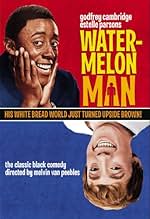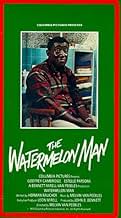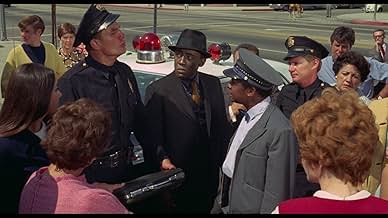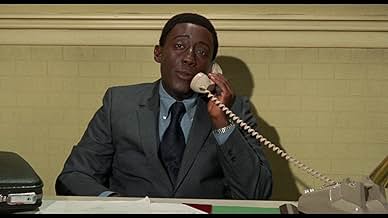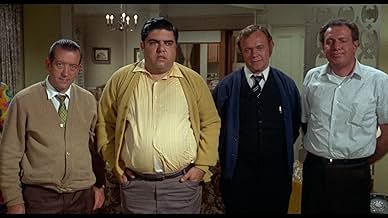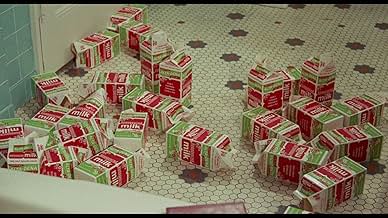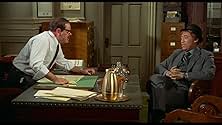VALUTAZIONE IMDb
6,7/10
3151
LA TUA VALUTAZIONE
Aggiungi una trama nella tua linguaJeff Gerber, a racist white man, wakes up one morning to discover that he has become black.Jeff Gerber, a racist white man, wakes up one morning to discover that he has become black.Jeff Gerber, a racist white man, wakes up one morning to discover that he has become black.
- Nominato ai 1 BAFTA Award
- 1 vittoria e 1 candidatura in totale
Paul Williams
- Employment Office Clerk
- (as Paul H. Williams)
Recensioni in evidenza
First - WHO's Godfrey Cambridge?!?! Yeah - he was a comedian. And a VERY funny one. Sigh.
OK, now that I've said that, let me make a couple of things understood. A lot of people who've written comments about this are either too young to remember the 60's/70's or are trying to relate to this film from today's perspective.
This film was written/directed by Melvin Van Peebles, who - at the time - was (and, by some - unfortunately) considered a 'controversial (black) artist. Second; yes, the makeup is not as good as the wonderful job done on Eddie Murphy in various films/skits, or the Wayans' brothers, but - for the make-up tech of the day - it was VERY good (look at the scene in the beginning when Godfrey's exercising (naked!), and then going to the shower. I just watched it on HD, and it still holds up VERY well (and as an aside; I saw this film first when I was about 10 - on TV. I thought upon seeing it that REALLY was a white man who became black. So, just remember that while you might not think his make-up's up to snuff now, it sure did convince an earlier generation).
Understanding when this film was made, the 'situation' of race relations at the time, and the ability for a (black) artist like Mr. Van Peebles to MAKE this film is necessary in understanding how shocking this film was - in all those areas.
Yes - the film's a bit dated (but who isn't?). But watching this film - and understanding what I've just explained makes it all the more extraordinary. Alex P (miskatonic86), and Definitedoll (just to name a couple) are some of the few who understand this film's importance.
Mr. Cambridge is/was one of the best comics. His 'babbling' - or more accuratley, his riffing on a subject was part of his stand-up style (if you'd like to see Godfrey not as a 'babbling' person, but as a (slightly ominous - and funny) character, check him out in THE PRESIDENT'S ANALYST, or in COTTON COMES TO HARLEM. , amongst other appearances.
He's sorely missed, by me and many others who've seen him either on such shows as ED SULLIVAN, THE MERV GRIFFIN SHOW CAR 54 WHERE ARE YOU, THE DICK VAN DYKE SHOW, I SPY amongst MANY other shows. If not, you can see this huge talent's work on YouTube (YouTube's a GREAT resource for educating yourself about not current performers and artists. It's NOT just a place to look at ...cat's playing pianos, and other garbage).
As a glimpse (by a black artist!) into the 'white man's world,' and the world in general - at that time - Mr. Van Peebles should be given his deserved recognition (and Godfrey, we miss you!).
OK, now that I've said that, let me make a couple of things understood. A lot of people who've written comments about this are either too young to remember the 60's/70's or are trying to relate to this film from today's perspective.
This film was written/directed by Melvin Van Peebles, who - at the time - was (and, by some - unfortunately) considered a 'controversial (black) artist. Second; yes, the makeup is not as good as the wonderful job done on Eddie Murphy in various films/skits, or the Wayans' brothers, but - for the make-up tech of the day - it was VERY good (look at the scene in the beginning when Godfrey's exercising (naked!), and then going to the shower. I just watched it on HD, and it still holds up VERY well (and as an aside; I saw this film first when I was about 10 - on TV. I thought upon seeing it that REALLY was a white man who became black. So, just remember that while you might not think his make-up's up to snuff now, it sure did convince an earlier generation).
Understanding when this film was made, the 'situation' of race relations at the time, and the ability for a (black) artist like Mr. Van Peebles to MAKE this film is necessary in understanding how shocking this film was - in all those areas.
Yes - the film's a bit dated (but who isn't?). But watching this film - and understanding what I've just explained makes it all the more extraordinary. Alex P (miskatonic86), and Definitedoll (just to name a couple) are some of the few who understand this film's importance.
Mr. Cambridge is/was one of the best comics. His 'babbling' - or more accuratley, his riffing on a subject was part of his stand-up style (if you'd like to see Godfrey not as a 'babbling' person, but as a (slightly ominous - and funny) character, check him out in THE PRESIDENT'S ANALYST, or in COTTON COMES TO HARLEM. , amongst other appearances.
He's sorely missed, by me and many others who've seen him either on such shows as ED SULLIVAN, THE MERV GRIFFIN SHOW CAR 54 WHERE ARE YOU, THE DICK VAN DYKE SHOW, I SPY amongst MANY other shows. If not, you can see this huge talent's work on YouTube (YouTube's a GREAT resource for educating yourself about not current performers and artists. It's NOT just a place to look at ...cat's playing pianos, and other garbage).
As a glimpse (by a black artist!) into the 'white man's world,' and the world in general - at that time - Mr. Van Peebles should be given his deserved recognition (and Godfrey, we miss you!).
"Watermelon Man" might throw off quite a few people with its style of cinema. It's a work of the grandfather of American independent film, Melvin Van Peebles, and with that should come a certain measure of respect. Van Peebles may not have produced dozens of films, but he certainly turned the industry on its head 30 years ago. This is an interesting arrangement on the business side- hot off the European success of "The Story Of A Three Day Pass", Warner Brothers takes on filmmaker Van Peebles for a feature film. The story of Van Peebles versus the company in filming is a conte in itself, but the film remains poignant and striking in its cinematography and theme. Aggressive editing of both film and musical inserts highlight the subtle comedy and pure desperation of the story of a bigot who wakes up Black and watches the world turn against him.
It's something of a manic ride, but Cambridge gives it all the human character it can stand. His antagonist-cum-protagonist role gives you 360 degrees of frustration and forced humility. Van Peebles presses the more unreal moments into a sub-psychedelic form. Printed messages, color fills, choppy eye-effecting shots and that insistent score remind you that this absurdity is all too real. But ongoing themes such as "He stole something.. we don't know what yet," are darkly hilarious as is Cambridge's sharp wit.
"Watermelon Man" is serious film that will still make you laugh at times. This is not the kick-in-the-establishment-a** that "Sweetback" is, but it's an important step on the way. Alongside films such as "Cotton Comes To Harlem" (also with the superb Cambridge) and "Putney Swope," this is an important part of the early end of the Black film explosion.
Look for cameos by songwriter-actor Paul Williams as an employer and Melvin Van Peebles himself as a painter. Black cast staple (and director of "Dolemite") D'Urville Martin is also on hand as a bus driver in some of the film's funniest scenes.
It's something of a manic ride, but Cambridge gives it all the human character it can stand. His antagonist-cum-protagonist role gives you 360 degrees of frustration and forced humility. Van Peebles presses the more unreal moments into a sub-psychedelic form. Printed messages, color fills, choppy eye-effecting shots and that insistent score remind you that this absurdity is all too real. But ongoing themes such as "He stole something.. we don't know what yet," are darkly hilarious as is Cambridge's sharp wit.
"Watermelon Man" is serious film that will still make you laugh at times. This is not the kick-in-the-establishment-a** that "Sweetback" is, but it's an important step on the way. Alongside films such as "Cotton Comes To Harlem" (also with the superb Cambridge) and "Putney Swope," this is an important part of the early end of the Black film explosion.
Look for cameos by songwriter-actor Paul Williams as an employer and Melvin Van Peebles himself as a painter. Black cast staple (and director of "Dolemite") D'Urville Martin is also on hand as a bus driver in some of the film's funniest scenes.
Somewhat unevenly charts the journey of a successful, loud and bigoted insurance salesman's transition from loathed go-getter to loathed gone-goner. The early twist in the tale, allows an opportunity to see a strong central character face a new challenge. However, sadly, the storyline passes up the chance to see a fighter fighting and the direction becomes bogged down in a realisation that Gerber is beaten from the very moment he is plunged into what the film perceives as an underclass. A particular shame, therefore, as it declares race crossover to be a sentence as opposed to an alternative - there is no real optimism afforded to Gerber after the key white/black event and the film might have been stronger with such an exploration.
The film can be disturbing; but with slick,in your face, stateside put-downs 'The Watermelon Man' certainly enters a sensitive subject area head-first and allows the viewer to make an early judgement.
Whilst the storyline delivers meagre reward in terms of development, there is enough here to warrant a recommendation. Cambridge is outstanding as the hounder who becomes the hounded and the spine of the film is its humour bordering on the cheap for sure, but funny, often hilarious and providing the piece with an underlying energy. Racing the bus to work on foot, crudely separating the mugs from their money, learning to take hate on the chin its all here.
The strength of the final ceremony/scene smacks of eventual acceptance, a sense of belonging and possibly a new way forward; this will shock many as it is bitter-sweet, turning laughter into cold realism. Perhaps Van Peebles was taking the easy option? I think a sequel would have been a fitting reward.
I rate it highly, even after considering its faults.
*********************************************************
UPDATED REVIEW: Today is 1 March 2005 and, courtesy of USPS, Amazon/Lasercorner.com and Travel Inn West 42nd St, NYC (long story ), I have now received the DVD of this film. I first saw it in the early 1980's and have been raving on about it ever since, saying to anybody that wanted to listen, that it was hysterically funny. It still cannot be purchased directly in England.
So today I watched it again, in the new high definition print. I want to amend my original review
The film made me feel guilty about how much I laughed when I first saw it. Yes, it still has great comic moments but there is so much more to it. Scene 11 'property values', sees Jeff Gerber's formerly pleasant neighbours confront him at home and they offer him $100,000 for him to move out of the area. This scene made me feel sickened. Firstly because it shows just how bad the racial situation was in America (surely it has improved since then??) and secondly because, on the first viewing all those years ago, I just didn't "get it" I saw an overall humour, where I should have seen the out and out bigotry, ignorance and sadness. After this pivotal scene Gerber tells his boss to stick his job and he moves on to get his own insurance business, settle into a community that he likes, reforms a long-distance dialogue with his blinkered wife and simply get on with being Jeff Gerber. In that respect my original review is seriously flawed as he is not completely beaten by race crossover at all in fact he makes it work for him and a lot of positives come out in the final analysis. It uplifted me.
Hey, enough of the deepness! It is still a great film to own, share and talk about, even after its flaws are considered. I just felt that I hadn't appreciated the finer points of it until now, many years later.
The film can be disturbing; but with slick,in your face, stateside put-downs 'The Watermelon Man' certainly enters a sensitive subject area head-first and allows the viewer to make an early judgement.
Whilst the storyline delivers meagre reward in terms of development, there is enough here to warrant a recommendation. Cambridge is outstanding as the hounder who becomes the hounded and the spine of the film is its humour bordering on the cheap for sure, but funny, often hilarious and providing the piece with an underlying energy. Racing the bus to work on foot, crudely separating the mugs from their money, learning to take hate on the chin its all here.
The strength of the final ceremony/scene smacks of eventual acceptance, a sense of belonging and possibly a new way forward; this will shock many as it is bitter-sweet, turning laughter into cold realism. Perhaps Van Peebles was taking the easy option? I think a sequel would have been a fitting reward.
I rate it highly, even after considering its faults.
*********************************************************
UPDATED REVIEW: Today is 1 March 2005 and, courtesy of USPS, Amazon/Lasercorner.com and Travel Inn West 42nd St, NYC (long story ), I have now received the DVD of this film. I first saw it in the early 1980's and have been raving on about it ever since, saying to anybody that wanted to listen, that it was hysterically funny. It still cannot be purchased directly in England.
So today I watched it again, in the new high definition print. I want to amend my original review
The film made me feel guilty about how much I laughed when I first saw it. Yes, it still has great comic moments but there is so much more to it. Scene 11 'property values', sees Jeff Gerber's formerly pleasant neighbours confront him at home and they offer him $100,000 for him to move out of the area. This scene made me feel sickened. Firstly because it shows just how bad the racial situation was in America (surely it has improved since then??) and secondly because, on the first viewing all those years ago, I just didn't "get it" I saw an overall humour, where I should have seen the out and out bigotry, ignorance and sadness. After this pivotal scene Gerber tells his boss to stick his job and he moves on to get his own insurance business, settle into a community that he likes, reforms a long-distance dialogue with his blinkered wife and simply get on with being Jeff Gerber. In that respect my original review is seriously flawed as he is not completely beaten by race crossover at all in fact he makes it work for him and a lot of positives come out in the final analysis. It uplifted me.
Hey, enough of the deepness! It is still a great film to own, share and talk about, even after its flaws are considered. I just felt that I hadn't appreciated the finer points of it until now, many years later.
Melvin Van Peebles' big Hollywood film is a very smart, funny, and in the end tragic satire of race relations in America c. 1970. Today, it doesn't get nearly the hoopla that "Sweet Sweetback" does, but in a lot of ways it's a better movie. Biting satire is often a better way to express righteous anger than simply getting all righteous, and this is an example: under the laughs, this is a deeply angry film.
Godfrey Cambridge is magnificent in his two-tone role, and the supporting cast (including a couple of routines by the great Mantan Moreland) is also very fine. The rage underpinning the whole story doesn't find full, overt expression until the very last scene, which presages Van Peebles' leap into more obviously black revolutionary politics in "Sweetback." A very good, very funny, important film that deserves to be much better known today than it is.
Godfrey Cambridge is magnificent in his two-tone role, and the supporting cast (including a couple of routines by the great Mantan Moreland) is also very fine. The rage underpinning the whole story doesn't find full, overt expression until the very last scene, which presages Van Peebles' leap into more obviously black revolutionary politics in "Sweetback." A very good, very funny, important film that deserves to be much better known today than it is.
8tavm
Continuing to review African-Americans in film in chronological order for Black History Month, we're still in 1970 when director Melvin Van Peebles makes his first major studio feature having previously done a critically acclaimed independent one called Story of a Three Day Pass. He casts comedian Godfrey Cambridge as Jeff Gerber who we initially meet as an obnoxious white insurance man-along with wife Althea (Estelle Parsons) and their two kids of different genders-who likes to run when leaving for his job in order to beat the bus. By the way, the light-skinned makeup on Cambridge is about as convincingly white on him as it was on Eddie Murphy in the "White Like Me" short film he did on "Saturday Night Live", that is, not much. Anyway, when the change comes, well, that's when all hell breaks loose! Now, knowing what I know about ironic humor concerning stereotypes, I found the whole thing just a little over-the-top and, you know what? I also found the whole thing hilarious! I mean, how can you not laugh at the attempts Godfrey keeps making to turn himself "back" like drinking lots of milk or putting his face in plaster. Plus, there's many funny sudden turns from now-"brothers" like the bus driver played by D'Urville Martin who claims to be Hispanic or Mantan Moreland as the counterman at his regular eatery who, when asked to look at his skin, says, "I don't need to look at your skin, I can see my own!" And wait till you see how Three Stooges regular supporting player Emil Sitka reacts when he gets attacked by Jeff over some new sunlamps! Not to mention Jeff's bed scenes with a flirtatious secretary named Erica (Kay Kimberly). I think I've said enough so all I'll say now is that Van Peebles provides much funny stuff from Herman Raucher's script in addition to his own contributions with his occasionally distorted score. So on that note, Watermelon Man comes highly recommended. P.S. It's quite interesting seeing who's also in this movie besides those I've already mentioned like singer/songwriter Paul Williams-here credited with the middle initial H-as an employment clerk or a young girl named Erin Moran-later to portray the teen Joanie Cunningham on "Happy Days"-as daughter Janice Gerber.
Lo sapevi?
- QuizMelvin Van Peebles: The artist who letters Jeff Gerber's new office door.
- BlooperDr. Wainwright asks Jeff if he knows that the first man to die in an American war was Crispus Atticus. The man's name was actually Crispus Attucks, NOT Atticus. The doctor puts in an extra syllable.
- Citazioni
Delivery Man: That guy needs a sun lamp like Fred Astaire needs dancing lessons.
- ConnessioniFeatured in The Real Deal: What It is (2003)
- Colonne sonoreLove, That's America
Written and performed by Melvin Van Peebles
I più visti
Accedi per valutare e creare un elenco di titoli salvati per ottenere consigli personalizzati
- How long is Watermelon Man?Powered by Alexa
Dettagli
Botteghino
- Budget
- 1.000.000 USD (previsto)
- Tempo di esecuzione1 ora 40 minuti
- Mix di suoni
- Proporzioni
- 1.85 : 1
Contribuisci a questa pagina
Suggerisci una modifica o aggiungi i contenuti mancanti

Divario superiore
By what name was L'uomo caffellatte (1970) officially released in India in English?
Rispondi

